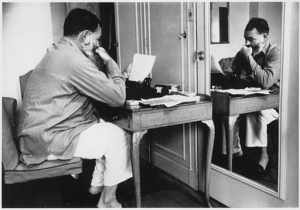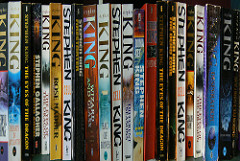Creating a Writing Habit that Works: Muses, Magic and Faith
Any writer who has ever had to stare down the blank page knows that it is a frightening experience. There is always the possibility that the words won’t come; that there is no story to be told. Throw in a busy life with a day job, kids or whatever else you might do and it makes for tough times when trying to establish a writing routine.
What some writers might not realize is that they are in good company. Everyone from Margaret Atwood to David Foster Wallace has had some difficulty establishing a routine. Some authors might choose to believe that their creative genius stems from an invisible muse or that it is best to wait for inspiration to strike, but in reality, cultivating a strong writing habit is the best way to find success. How, then, do writers develop a solid routine if not with the help of a muse?
Give Yourself the Time of Day

A lot of writing books talk about picking a static writing schedule and sticking to it, rather than waiting for “the muse” to strike. While it is true that writers who write seriously give themselves office hours, it is equally important to consider which hours work best for your own lifestyle. Over time, writers develop their own schedules and habits, but what matters most is the act of writing that makes you a success. Whether that means writing from 10 PM to 3 AM like Michael Chabon, or from 4 AM to 7 AM like Toni Morrison, setting up a schedule means taking your writing seriously. Of course, learning to be flexible and writing whenever there is a spare moment in the day can also be a great way to keep writing daily.
In Naming the World, Bret Anthony Johnston writes: “I don’t believe in talent. Nor do I put faith in the idea of inspiration, the muse, or the muse’s shadowy and malicious twin, writer’s block. …It’s a calling, an act of courage, and act of faith.”
The myth of the muse stems from the notion that writers are not fully responsible for the work that is created. Certainly it is easier to blame an invisible muse if a draft doesn’t seem good enough. Of course, if a writer puts all of his or her faith in the muse, it is a whole lot easier to justify not writing at all when there is no inspiration. Choosing to sit down at the writing desk each day with whatever time we have is an act of faith in our writing, and isn’t faith a kind of magic?
Set Achievable Goals

Starting small is an excellent way to build up confidence and accomplish a big goal. Writing a novel in scenes over a number of months can be extremely effective, especially when there is a local writing group who might hold you accountable. Using daily story starters such as Sarah Selecky’s ten-minute writing prompts or free-writing for a set amount of time is good practice for essential writing skills, but it also provides opportunities to stumble across those moments of “genius”.
Some authors, such as Samuel Archibald, think constantly about their stories until they have a spare moment to write. Others carry around notebooks to write down ideas as they come. Even Ernest Hemingway kept a log book in his office where he could record how many pages he had written each day. How best to set goals and keep track of them varies depending on the writer.
The more often one writes, the less pressure there is to write something “brilliant”. It is amazing how easy it can be to sit down at the writing desk when the pressure to create the next masterpiece has been lifted. Setting a daily no-pressure writing time allows the creative juices to flow more easily; this is where the “magic” happens. Creating systems for generating ideas is a good way to cultivate creativity and in turn, meet writing goals.
Don’t Forget to Have a Life

It might sound counterintuitive to creating a good writing habit, but spending time with family, meeting friends or even going for a walk can help a writer to stay on track. Sometimes, it doesn’t hurt to have a limited amount of time to get that writing done. Toni Morrison once commented that she “didn’t have time to whine” as a single mother with a job; she either wrote in the time she was allotted or she did not.
Stephen King wrote about his own struggles with managing his writing and home life in his memoir, On Writing. He says, “It starts with this: put your desk in the corner, and every time you sit down there to write, remind yourself why it isn’t in the middle of the room. Life isn’t a support system for art. It’s the other way around.”
However one manages to find a good writing-life balance, a vital aspect of establishing a writing habit means being honest with oneself. Blocking off seven hours of solid writing time might be ideal, but not always realistic for all writers’ schedules. It is easy to get discouraged if you deny yourself all other aspects of life. Although you might get a lot of writing done, being kind to yourself and knowing when to take a break makes returning to the writing desk enjoyable as well as productive.
Be Your Own Muse

In her 2009 TED talk, Your Elusive Creative Genius, Elizabeth Gilbertson discusses her own fears about writing. Namely, after her colossal success with Eat, Pray, Love, she was stuck on the idea that her best work was behind her. What she discovered was that the best way to triumph over her fears of writing “the worst book ever” was to just write. She says, “I’m going to keep writing anyway because that’s my job. And I would please like the record to reflect today that I showed up for my part of the job.”
Show up and give everything to the story, whether or not it is brilliant. Don’t worry about what the muse has to offer. Great ideas emerge from scene work and explorative writing. Some might argue that this is the “muse”. Quite possibly, it is also just the fruit of hard work.
Creating a good writing routine isn’t always easy, but it is possible. As writers, we feed our muses through careful thought and time. If writing creatively is a dialogue with the wider literary community, then the best way to nourish the muse and entice it to return is to engage in those discussions and above all, show up. So. Sit down at your writing desk. Pick up your pen. Face the blank page with courage. Don’t worry. The muse is already there. Or, as Bret Anthony Johnston says, “The act of writing is itself the muse.”
Works Cited
Bret Anthony Johnston. Naming the World. New York: Random House. 2007.
Ellis, Samantha. “Do We Need Another Fantasy Novel? It Seems We Do.” The Guardian. 22 December, 2002. Online.
Gilbertson, Elizabeth. “Your Elusive Creative Genius.” TED talk. 2009.
Stodola, Sarah. Process: The Writing Lives of Great Authors. New York: Amazon Publishing. 2015.
King, Stephen. On Writing. New York: Scribner. 2000.
What do you think? Leave a comment.











When I’m writing, my favorite thing to do is hop in the car and take a ritualistic cruise through my home city (I have a certain set route that I use). I do my best thinking about fiction while I drive, and numerous times I’ve had a situation work itself out in my head while I drive around listening to the radio. Environmentally and financially friendly? Not so much. But fictionally effective? Absolutely.
That’s a good idea! I might have to try that out sometime 🙂
If you play an instrument it also helps to explore writing some great ideas on paper.
It’s as if you are playing the drama or action with each stroke.
Great Article 😉
Recently I had to write a whole swag of articles in one week. To do that I had to write through the day as well. After I had finished, it took a few days for my writing inspiration to come back. So, it seems that I am at the peak of my writing creativity when I write about 700 -1000 words a day. Less and I’m out of practice. More and I’m on overload.
Quite difficult to keep that balance, eh?
That is difficult! I tend to write by scenes…if I get three or four scenes done I’m happy. Otherwise, my brain gets kind of overloaded.
I get my best (and most clear) ideas when run. Something about being outdoors and the sunshine (and the endorphins) that inspires me. Thanks for sharing.
Thanks for commenting! I love a good jog before I sit down to write too!
Each writer has a habit that I either share or admire. I tend to be an early riser (4:30am usually) and that is when I get most of my writing done. Before breakfast, before most of the world wakes.
Wow! I wish I could wake up that early!
I love your title. Best title ever!
Thanks!
I am one of those who needs a muse. Without the inspiration for writing an idea that MUST be said I am lost. But once the muse does get hold of me, it doesn’t let go until the piece is written.
I’ll bet you write really quickly when the muse does strike!
Absolutely. Once the muse strikes everything seems to pull together. It is getting to that zone.
So true! Do you like to write on the computer or by hand?
I always wrote by hand until I started writing for the Artifice. Please don’t judge me for being so old fashioned : )
No judgement here! I still write by hand. 🙂
I don’t think many people can write in the morning. Specially holds true if you don’t write for a living. I do my best in the afternoon. The easiest way for me is to write is set up a fixed amount of hours to dedicate to writing. In some occasions I have managed to do five pages a day for a week (but some times I can only get a sentence or two).
Hi riik!
It’s true that writing in the morning is easier when you’re doing it for a living. I do the same thing with a set amount of time for writing–usually for me it happens whenever I get a break in the day! (I.e. Nap time)
I am trying to develop my habit now, so this was really helpful. Thanks for posting!
Thanks! Happy writing!
I am so much of a mulit tasking woman that I tend to write whenever I can and anywhere I can! But my favorite is to sit on the boardwalk as the sun is going down or at a park. I need to see the sky and let my mind run free!
Writing outside is great!
Here’s my writing habit. I use the computer to “write” and what I’d do is to choose a font that I’m comfortable with, and start typing away.
Hi Heartbeat,
Whatever works, right? Do you like to measure writing progress with time or page count? I’m always interested to see how other writers work.
My writing routine is very odd. I’m a teacher and I can’t seem to start writing until the school year is well under way. I don’t typically start writing until after Christmas and then I write furiously for about four months. By that time, I usually need a break from writing.
So I am what you might call, “A Seasonal Writer”
I said my routine was weird, but it works for me.
Love it! So true–whatever works! Do you like to write in the morning or afternoon/evening?
I haven’t developed any noteworthy regiment. The only thing I can say that I do without fail is carry a notepad with me. And I write notes into it all the time, throughout the day.
When I do write – I like to spend at least an hour doing so. I also often spread out a writing project over more than one day. But I’m still experimenting and trying to find what works most optimally for the best of writing.
Hi Bland,
I think it’s great to experiment with different writing schedules. Carrying around notebooks or notepads is great too.
I’m a mother. When my son Sebastian was a toddler, I hardly wrote. All I wanted to do was sleep! The first two years of motherhood are really hard because the task of being a mother is so incessant. And the few hours when baby is asleep are often taken up with domestic tasks.
After Sebastian turned 2, I started writing again. But I had to train myself to write in the evening. After all, how can you write in the morning when your toddler is jumping up and down on you, screaming “Mummy!”, “Mummy!”
Hi Tora!
Thanks for sharing your experience! I’m a mom too, so it’s always great to hear from another writing mom.
I mostly write in the morning when my little guy had morning naps, although now I tend to take my writing time whenever I can get it. So true about writing while they’re shouting “mummy!”
I am a writer and have been one since I was 7 but now I am focused more and have been perfecting my craft.
That’s great! What sorts of things do you like to write?
i tend to write lying down or in a very compact positon. i never write in pencil. i prefer electronically but i can write in pen. i never write during the day. the night helps me feel less rushed and calm.
That’s so interesting! I like very early morning (when I can manage it) for that same reason.
Discipline is what I strive for. I could have written “I want to be disciplined” but somehow it wasn’t seemly. What seems to happen, though, is that a subject will churn around and then emerge at about shoulder level, travel down my arms and onto the keyboard or paper of its own accord. I’ve learned that I need to get out of its way or risk losing it. So, I’m looking for the balance between a daily routine and those bursts of flow.
Hi Elizabeth,
I know what you mean about sometimes having to get out of the way of inspiration. Isn’t it great when those bursts happen? For me, writing every day seems to create more opportunities for inspiration (although sometimes it’s more like staring at a blank page and banging my head against my desk!)
I think that so many of us have too much noise going on inside our heads (noise about work, kids, family, work, bills etc) and these certainly get in the way of letting that creative side of your brain work. Establishing a habit is very helpful but I wish I could also silence the noises that intrude too because even if I plan, those pesky voices keep butting in (What are you going to make for dinner? Have you paid the phone bill? What are you going to get mum for her birthday …. deary me). It’s like I have a little devil sitting on my shoulder whispering in my ear and sabotaging my writing.
You’re definitely not alone there. Going for a jog sometimes helps my mind focus…or you could always do freestyle writing and see what comes out. I read somewhere that journaling for ten minutes or so is a good way to clear the mind too.
I am lucky to have a lot of flexibility. As my schedule allows, I prefer to write in the morning, with a cup of tea, before checking e-mails. I should probably wake up earlier to take full advantage of my morning writing, but I have a terrible time getting to bed early!
Hi vermil,
I can never seem to get to bed early either! Writing in the AM with a cup of tea sounds lovely!
Writing habits still amaze me today. I know a lot of weird habits of writers.
It’s always fascinating to see how others work.
One tip: I email myself the stuff I write through gmail…just incase I don’t back up soon enough and lose it.
Good idea!
This was very helpful, emotionally. I think that is where I get caught up most of the time; fear that I have nothing to say, or that it won’t be brilliant each and every time. Mostly I don’t care if its ever brilliant, just that I don’t want someone to criticise it. That’s the hardest part for me I think.
Criticism is hard, isn’t it? I think that writing for yourself is always a good start.
Good advice. Great article.
Thanks so much! 🙂
I find myself to be most creative right before I fall asleep and it sucks because by the time I want to get my thoughts out on paper, I’m way too tired to do so.
But I’ve noticed recently, I’m most inspired at night when I’m listening to ambience or nature sounds, when I’m actually out in nature, or when it’s really quiet in my house.
You really have to be in the right state of mind when you’re writing, which is definitely tough when there’s so much clutter from society and stress from life. 🙁
Do you keep a notebook beside your bed? Mood setting music is great too. I like the “epic writing series” on YouTube.
I don’t keep a notebook beside my bed but that’s actually a great idea! & I’ll check out that series!
Great! Happy writing!
Yessss. Everything about this resonated- and reminded me of everything I Should Be Doing.
Thanks! Happy writing!
I’ve always done my best writing at night, when the rest of the family is asleep. I’ve always been a night person anyway, but when my kids were really little, it seemed that was the only time I could get any peace and quiet.
Amen to that! The house does seem quieter at night…
All great tips!
Thanks!
Muses become your scapegoat, like the article points out, when you blame them when you feel your writing isn’t at its best. Be your own muse. If you cannot claim your work at its worse perhaps you are not in a position to claim it at its best.
Or ditch the muses altogether.
Exactly!
I really loved this post. I love to peer into the glass a bit to see what other writers, the greats, have really done on a day to day basis to create such masterful works.
Thanks!
This is so helpful!! I’m definitely taking this to heart
I’m so glad!
nice info.
Thank you 🙂
The ever-elusive muse is an excellent servant but a bad master. That said, don’t fail to transcribe its words when it strikes at inopportune hours.
Do you keep a journal at your bedside?
I usually write when there’s nothing on my mind…its completely blank. That is the point where I can be totally honest with myself. I don’t think at that point, but I just keep writing…but that happens only once in a while! But then again, it gets the best out of me…
I really needed this today. I’m going to commit a time and stick to it.
That’s great! Happy writing!
I think each writer has to have his own rhythm, his own pace. I completely agree to be our own muse, but also not to stick to a certain muse, we should always be open to inspiration.
Thank you!
You’re very welcome!
Thank you for sharing this article! It has left me feeling inspiring all over again to write.
I’ve never considered setting a specific writing schedule. Usually when I write something specific, I just bang out whatever the idea is when it comes to mind. Considering this, I might just start jotting down my ideas throughout the day until my set-aside time to write.
Good idea! You never know what might come out of it 🙂
Usually, when my mind is completely blank, I am able to churn out some of my best writing. I’ve tried to stick to a strict schedule, but I find that when I force myself to write, it is complete garbage. Find a way that works for you, but keep writing.
Very true. Everyone works differently. I read somewhere that Zadie Smith spends whole days just reading.
That was a very inspiring piece of writing there, thank you! Apart from strongly believing in magic, my other little trick for getting inspired is talking to my loved ones. Writing creates another world, one where you can open up yourself truly and its fascinating what that world can offer you! Stay inspired! 🙂
I’m glad you liked it 🙂
As a college junior who takes ADD meds, I am hyperfocused in the morning. Whatever productive action I do, I do it best in the morning. Once my meds wear off in the evening, I always find it less stressful to unwind.
I think what works for me is to write something in the morning, and do whatever other productive activity I decide is important.
The essential principle for me is doing SOMETHING, and not writhe in a state of incessant indecision.
I like to write in the morning too!
Writing as a habit is something I’ve had to learn the difficult way! I used to wait for inspiration/the muse to seize me with a strike of genius, but then I quickly realized that I would write very little if at all if I needed to solely depend on it to write.
This article is great! I love how you mentioned to “give yourself the time of day” and not to worry about what your writing becoming a masterpiece. I think I have to work on that. Mostly I wait for inspiration, and I’m left waiting for months at a time. And when I do write in these times, sometimes the expectation of brilliance doesn’t always reflect on the page. Thank you for writing this, it definitely inspired me to write whenever I can, even if I may not feel as if I have a genius idea.
Thanks! I’m glad you liked it!
This is a really good reminder in regards to not trying to force myself to write an entire work straight away. I often expect myself to have an idea, immediately start writing, and not stop until I’ve finished the entire book, all in one go. This nearly always ends up with a folder of documents on my laptop containing 5-10 chapters each, or however much I managed to achieve before I lost motivation or interest. I can be far too much of a perfectionist, and if the words don’t come out properly the first time, they tend to never end up coming out at all. These are definitely useful points and advice.
Thanks SophIsticated! Sometimes I think that the time I spend letting my mind wander is when I figure out how to continue a narrative that I’m writing. 🙂
A great article that I wholeheartedly agree with! I’m afraid I am guilty of waiting around for the ‘muse’ to show up and provide me with the inspiration I need to start that story I keep putting off. I think developing a writing routine is the key – it reminds me of an article I once read that likens writing to a muscle; the more you use it, the stronger it will become.
By developing a routine, you’re giving yourself the chance to not only hone your skill but potentially stumble across some interesting ideas that could be put to future use. Free-writing is a great exercise for loosening up creative ideas and one I need to use more often.
This article once again reminds me to develop a daily writing routine and stick to it – you never know what can happen when you give yourself permission to just write and not worry about the end result!
Hi Candice, I couldn’t agree more. The more you write, the more you will discover about your writing practice. I also find that I have more ideas when I write more regularly.
Some good advice! I often find it difficult to have a set time to put aside for writing and have always gone for an-in-the-mood-writing-moment (usually an idea comes when I’m driving). Trouble with waiting for an-in-the-mood-moment I have very long, stagnant periods of not writing. Definitely better to create a daily writing routine.
Cin, I know what you mean about in-the-mood writing bursts! I think those are great too.
Thanks for the solid tips and reminders. I’m going to file away that Stephen King quote, “Life is not a support system for art. It’s the other way around.”
Thanks Stephanie!
Well written, and the references were really useful. I’m excited to check out the Ted Talk.
Thanks EzraChapman 🙂 The TED Talk is GREAT! I hope you enjoy it 🙂
Thanks Stephanie! Glad you liked the article 🙂
This site, The Artifice, helps by allowing comments and other writing opportunities. Put aside publishing a piece, just commenting daily, for example allows one to organize coherent thoughts. It is not necessarily the task of developing original ideas, just commenting on other pieces that helps in one’s own writing.
Hi Joseph, it’s true that sometimes jumping into a conversation can spark inspiration. Happy writing!
This was an interesting read. I need to learn to starting taking time to get serous about my creative writing which is hard to do around my university so to begin small I have decided to join a writers group which has given me a reason to write so I now see the meetings as business meetings instead of a social group.
Hi Melver, that sounds like a great idea 🙂
I really appreciate this article as I feel that a lot of new writers– myself included– assume that writing should come naturally and immediately.
Thanks sophiawestover! Happy writing!
Thank you for this article! I’m reading the article years after you published it; however, it’s still a relevant read even during the pandemic. I’m in quarantine with my family (and have been for more than a month now), and it’s so tough to pull myself away from my domestic duties these days, just sit at my desk, and write. I’ve decided to wake up in the morning before my family rises, so I can spend that time writing without distraction or guilt.
Thank you so much! I’m so glad that my article helped. Happy writing!
It is refreshing to read that writers are not just muses’ recipients, as industry loves to tell us to build image and personify their products, thanks !